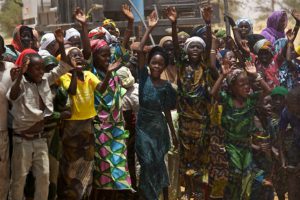by Michelle Wolf
It’s difficult to imagine living a life without clean water. In First World countries, clean water is a basic need that is accessible and taken for granted. Clean water is an assumed right. Cities are held accountable for collecting and filtering water before that water enters homes. In places like Niger, clean, safe water is not assumed. What should be a basic human right is often privilege, a luxury that can’t be counted on.
Board member Ida Harding has been associated with Wells Bring Hope since the beginning. She was with the founder Barbara Goldberg when the idea was planted during a presentation by former Los Angeles district attorney Gil Garcetti. Ida has traveled to villages in Niger on several occasions and witnessed first-hand the positive effect clean water has on the population.
Within a year of its inception, Wells Bring Hope had raised enough money to drill 10 borehole wells in Nigerien villages. After the wells were drilled, Barbara and Ida, along with a small group of other women, were inspired to travel to Niger to see the results of their work and to personally experience what it’s like in a village without safe water.
The Nigerien women that Barbara and Ida met during their visits have overcome unfathomable challenges. On one trip to Niger, they met a woman who had watched 11 of her 12 children die from illnesses that could have been prevented if clean water had been available. On another trip, they met a woman who had to choose between walking for hours to retrieve water for the village and caring for her three-year old daughter who was dying of diarrhea.
In villages without safe water, homes are often made of limber straw. Fields are bare and families have no crops or livestock. Children’s faces are caked with dirt and dust.
The difference clean water makes is immense. The threat of diarrhea and other waterborne illnesses is eliminated when a well is drilled. Girls who once walked hours to fetch water are able to attend school. Women prepare meals with clean water, are able to spend more time with their children, and with the micro-financing training Wells Bring Hope provides, they can use their newly available time to start small businesses. Buildings that were once made with straw are can be built with strong bricks. The children are healthy and clean, and villagers are happy.

Young women celebrating new well.
Today, Wells Bring Hope has funded close to 450 wells. The services we bring to villages have directly affected more than half a million lives and will continue to do so for generations to come. Please consider donating your time and, if you are able, money to Wells Bring Hope. 100% of all donations go directly to well projects that provide the basic need of water to Nigerien villages.


